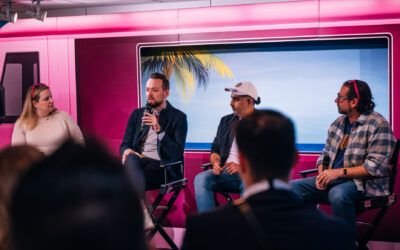Blockchain for Business
The following is a summary of a presentation provided by Dale Chrystie, Business Fellow and Blockchain Strategist at FedEx at the 2022 D2 Summit in New York City.
Key Points
What’s your company’s expectation for blockchain technology? Dale Chrystie, Business Fellow and Blockchain Strategist with FedEx, talks about how his company is approaching the technology from a global viewpoint—and who they are working with to get there. Their approach may surprise you.
- Blockchain is transforming industries where authenticity matters.
- Blockchains are championed at the C-Suite level.
- For global industries especially, there are no borders, so competition is key.
Standardization and Blockchain Technology
Based in Memphis, Tennessee, FedEx delivers to more than 220 countries and has more than 600,000 employees. The shipping powerhouse began exploring the opportunities of blockchain technology in late 2017. It didn’t take long for the company to decide it was all in. At a conference in early 2018, its founder, Fred Smith, stated that blockchains were going to completely change the worldwide supply chain.
Dale Chrystie is a Business Fellow and Blockchain Strategist for FedEx. He notes, that “If you are not operating at the edge of innovation, you need to be prepared to be commoditized or prepare to be extinct.” He explains that while FedEx believes peer-to-peer technology, smart contracts, and the other attributes blockchain technology provides are going to be transformative for companies, it’s also going to take a global village to get us there. “For it truly to be transformative, it has to be bigger than us,” says Chrystie. “A big global village all of us working together to build this foundational level.”
Coopetition for Open Source Platforms
The company is part of the Global Express Association—an association made up of only three members: DHL, FedEX, and UPS. The three companies are coming together to discuss blockchain technology—not on how the technology can assist them where they compete—but where it can assist them unilaterally: in reducing the frictions they all face, such as delays, resources, and people. Chrystie calls these across-brand-strategy sessions “coopetition”: Cooperating to develop the pro-competitive, open-source platform on which blockchains will be based.
Blockchain quality and accountability are two of the biggest appeals to a company’s decision-makers, and as such, should be championed at the C-Suite level. The technology provides a digital fingerprint, ensuring the end user of the product’s legitimacy. For example, through the use of a blockchain, vaccines can be tracked from their ingredients to production, to shipping, to the individual vial at the local pharmacy or clinic. The end users—the physician or the pharmacist and ultimately the patient—can be assured of the vaccine’s authenticity.
Another example of how blockchains, through smart contracts, can transform how a company does business is through its bottom line. Smart contracts create an automated process through a formula of if/then: if this condition is met, then this happens. So, for example, if this product is sent via this avenue, within these number of days, payment is automatically made, potentially reducing a company’s DSO, or the average receivables collection period.
Standardization
One of the reasons the adoption of blockchain technology is so important at the C-Suite level is the need for standardization. Standardization has long been critical to the successful infrastructure of everything from transportation (the national highway system, traffic control, water, and electricity) to communication (phones, the internet, and even the alphabet). “Standardization is absolutely critical in this space. We have to get to a point where we agree on what blockchain and Web 3 is….the important part of that is once we get to the standardization…it increases the enhanced network effect and increases adoption. Once I know what the rules are, as an entrepreneur, I can jump into that space.” With standardization, blockchain technology, won’t be, as he calls it, “the wild, wild West.”
To hear more on what Chrystie has to say about the future of blockchain technology, watch his presentation here.



